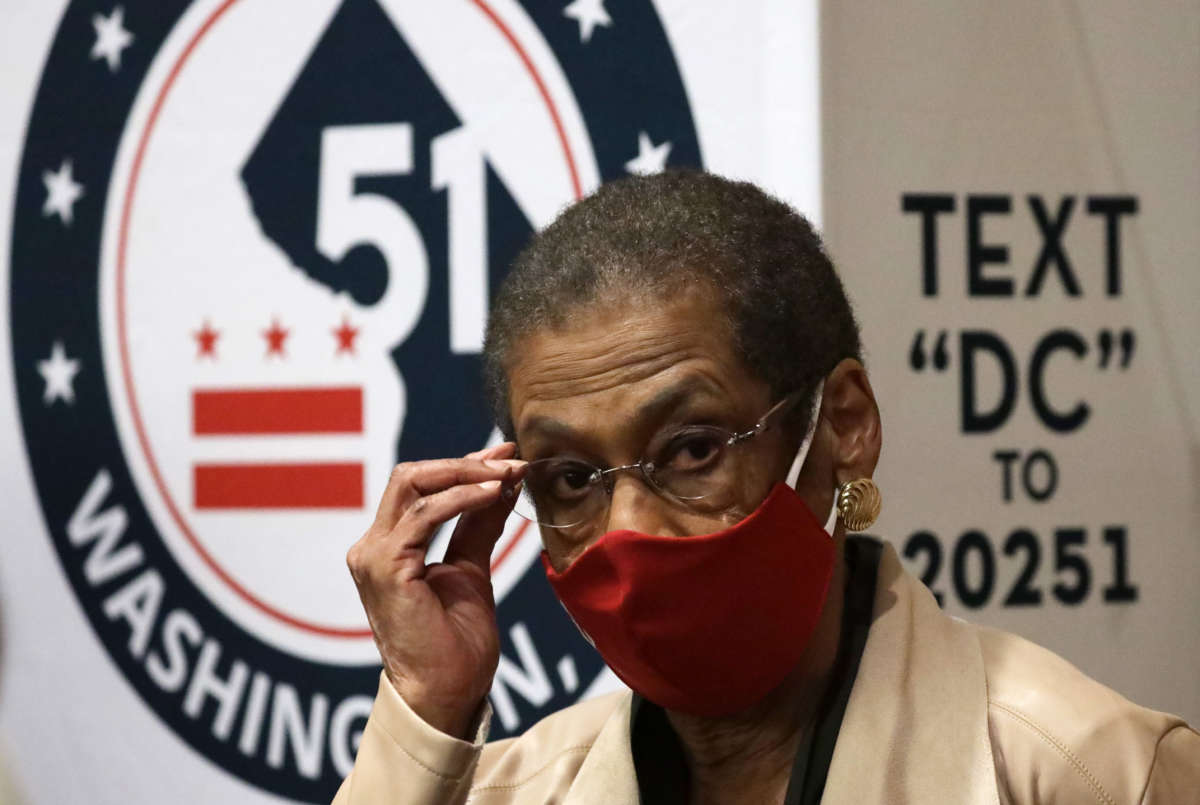Support justice-driven, accurate and transparent news — make a quick donation to Truthout today!
Democrats from the Senate and House introduced legislation on Wednesday that would make Washington, D.C., the 51st state.
The bill was reintroduced in the House by Eleanor Holmes Norton, a nonvoting delegate in the House who represents D.C. In the Senate, Tom Carper (D-Delaware) reintroduced the bill with the support of over three dozen of his fellow Democrats. Norton said on Tuesday that the bill now has over 200 co-sponsors in the House.
Making D.C. a state, which the Constitution grants Congress the right to do, would allow the region to have voting representation in Congress. Currently, they have one delegate in the House, Norton, who can serve on committees but cannot vote. There have been many attempts to grant D.C. statehood in the past, but they have always been rejected.
Uncompromised, uncompromising news
Get reliable, independent news and commentary delivered to your inbox every day.
“We are deeply indebted to Senator Carper for his unending efforts for D.C. statehood and his priority in reintroducing the Senate companion to our D.C. statehood bill this year with a record number of original cosponsors,” Norton said in a statement. “There’s never been a time when statehood for the District was more likely. We’re ready to achieve voting representation and full local self-government for the 712,000+ residents of the District of Columbia.”
Carper, similarly, had optimistic words about the bills. “Our nation’s capital is home to more than just federal buildings and monuments. It’s also home to more than 700,000 American taxpayers who, despite our nation’s founding mantra — ‘no taxation without representation’ — pay their share of taxes without full voting representation in either chamber of Congress,” he said.
“In fact, despite paying more in federal taxes per capita than citizens of any other state, DC residents have no say in how those taxes are actually spent,” Carper continued. This “isn’t a Republican or Democratic issue — it’s an American issue because the lack of fair representation given to the residents of DC is inconsistent with the values on which this country was founded.”
House Speaker Nancy Pelosi has committed to bringing the bill to a vote in the House, says Norton. It is likely to pass with a Democratic majority as a similar bill, also introduced by Norton, passed in 2020. However, Republicans are likely to shoot it down in the Senate, as the region is largely Democratic. Republicans think that it would essentially be handing Democrats two new senators.
Many have pointed out that granting D.C. statehood is also about racial justice and representation, as the region is 46 percent Black, compared to around 13 percent across the country. Shahid Buttar, a former candidate for Congress in California, pointed out that the region was majority Black until 2011, but is no longer so due to gentrification. “What does it suggest that DC statehood has become a real possibility only after gentrification left the District no longer majority black?,” Buttar wrote on Twitter. “This bill is long, long overdue.”
The attack on the Capitol earlier this month brought attention to the fact that D.C. isn’t a state, so city leaders weren’t able to call in the National Guard for hours in order to stop the Trump militants from breaking in. D.C. is a federal territory, and only Trump himself could have made that call. Norton, evidently, is trying to fix this regardless of statehood for D.C., and plans on reintroducing a bill that would transfer that power to the city.
Some say that both the attack on the Capitol and the lack of D.C. statehood are tied by a deep undercurrent of racism in the U.S. “I think that our entrenched systems of white supremacy protected the men and women committing treason,” Stasha Rhodes, campaign manager for the D.C. statehood advocacy organization 51 for 51, told The New Republic. “And for over 200 years, the same racist institutions have disenfranchised the majority Black and brown residents in D.C.”
The issue also brings renewed attention to the Senate filibuster, as the bill will likely not get the 10 Republican votes it will need to pass the Senate. If the filibuster didn’t essentially force every bill to have a supermajority to pass rather than a simple majority (which the Democrats currently hold in the Senate), then D.C. statehood would be much more likely to pass if all Democrats got on board. As things stand, many of the proponents of D.C. statehood are also for the abolishment of the filibuster.
Part of why both D.C. and Puerto Rico have struggled to become states is that they both lean Democratic. Historically, states have been incorporated when both parties get a “trade,” Vox reports, striking a partisan balance. However, there aren’t any right-leaning areas to trade, and there haven’t been for many years.
So, as recent fights over the filibuster have confirmed that it’s here to stay and there are no territories to trade for the Republicans, D.C. will likely remain simply a federal territory for now.
Media that fights fascism
Truthout is funded almost entirely by readers — that’s why we can speak truth to power and cut against the mainstream narrative. But independent journalists at Truthout face mounting political repression under Trump.
We rely on your support to survive McCarthyist censorship. Please make a tax-deductible one-time or monthly donation.
